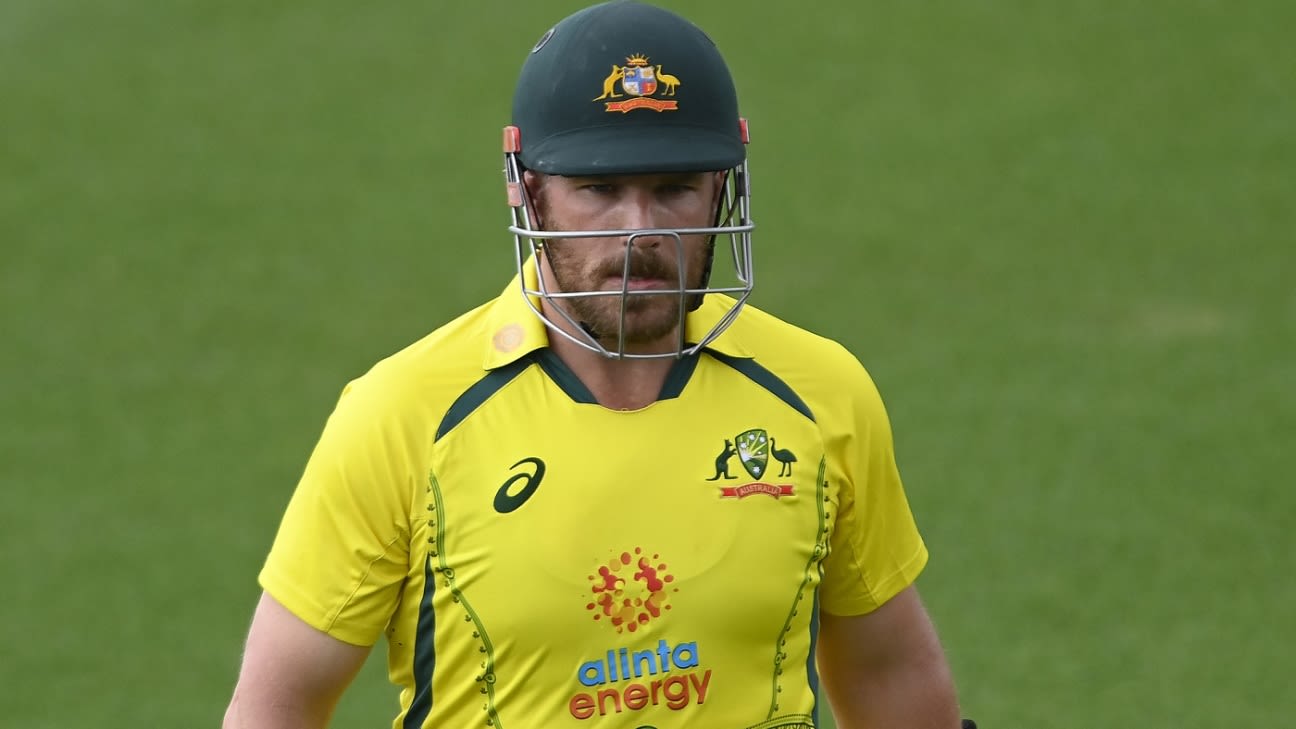“It has been a fantastic ride with some incredible memories,” Finch said. “I have been extremely fortunate to be a part of some brilliant one-day sides. Equally, I have been blessed by all those I have played with and the many people behind the scenes.
“It is time now to give a new leader the best possible opportunity to prepare for and win the next World Cup. I thank all of those who have helped and supported my journey to this point.”
For a long time he had set his sights on making the 2023 ODI World Cup in India his swansong, but said on Sunday he had started to think about this decision before the Zimbabwe series in Townsville and had realised next year’s tournament was out of reach. Though his recent knee problem is not causing major issues he does have a troublesome shoulder.
He will now attempt to defend the T20 title on home soil in what could be the final stage of his international career after Australia claimed the trophy for the first time last year.
“I could have tried to play the series against England, and that would have been a bit of a fairytale finishing at the MCG, but I think that’s never been my style to be self-indulgent in any way,” he said. “So it’s important that whoever takes over the captaincy, and whoever opens the batting, is given the best opportunity to take take the team forward and win the World Cup in 2023. I’m very comfortable and confident I would never have made it that far, just with my body as well as a bit of form.”
Australia have eight T20Is (plus an additional warm-up match against India) for Finch to try and find some form before starting their T20 World Cup campaign against New Zealand at the SCG on October 22.
“I think my T20 form has been pretty good for a little while now, [it’s a] totally different format, but I’m really comfortable that I’m still playing well, just haven’t got as many runs in this format,” he said. “Don’t know what the difference is, maybe a bit of intent, a bit of risk-taking that you get away with in T20 cricket.”
Finch confirmed he was committed to the BBL season with Melbourne Renegades after the T20 World Cup and would assess his career after that competition. The growing T20 franchise world offers Finch plenty of potential options on the domestic scene. Following the World Cup, Australia do not have any more T20Is until next August against South Africa.
“They’ll be a decent break before anything else so that will give me a chance to sit down and reassess where everything is at,” he said.
He had a particularly impressive record against Pakistan (49.16 average, two hundreds), England (48.35, seven hundreds) and India (48.66, four hundreds).
Finch was initially named T20I captain in 2014 but on the eve of the 2016 World Cup the job was handed to Steven Smith as the role was consolidated across the three formats and he was left out at the start of the tournament.
He was named the permanent white-ball captain after the 2018 ball-tampering scandal which saw Smith banned. He led Australia to the semi-finals of the 2019 World Cup in England before they were heavily beaten by the hosts.
“On behalf of Australian Cricket, I would like to congratulate Aaron on his vast contribution as captain of the Australian Men’s ODI team and as a wonderful exponent of the 50-over format,” Cricket Australia chief executive Nick Hockley said.
“Aaron is an enormously gifted and determined player whose outstanding deeds with the bat have been matched by his strong and inspiring leadership. His decision to step aside from the ODI captaincy now is typical of his selfless approach to the game.
“I’m delighted Aaron will lead the Australian team into the forthcoming ICC Men’s T20 World Cup where his leadership, experience and tactical nous will be integral to the defence of our T20 World Cup title on home soil.”
Whoever takes over the ODI captaincy from Finch will start with a series against England, which does not carry Super League points, straight after the T20 World Cup. Alex Carey will likely be a frontrunner for the job having stood in for Finch last year, although whether Finch also finishes up in T20s after the World Cup will be another factor if Australia want to have the same captain across formats. Carey is not currently part of the T20 side.
A return for Smith could be an option while Mitchell Marsh may come into consideration. An outsider could be Josh Hazlewood who has held the vice-captaincy and is now one of the leading white-ball bowlers in the world. Glenn Maxwell’s name will also likely be thrown into the mix.
Test captain Pat Cummins has previously indicated that taking on another leadership role would probably be too demanding. There is also the factor that it is limited-overs cricket that he will sometimes be rested from.
Andrew McGlashan is a deputy editor at ESPNcricinfo
